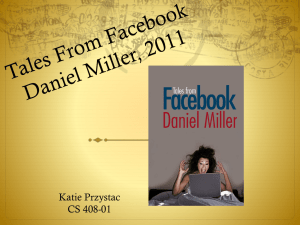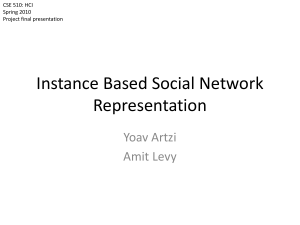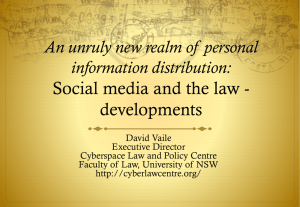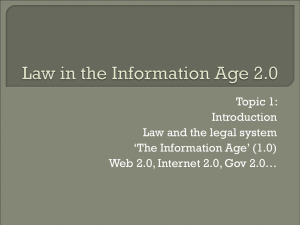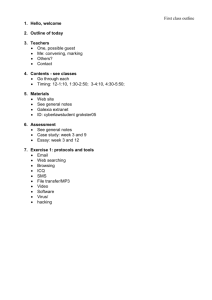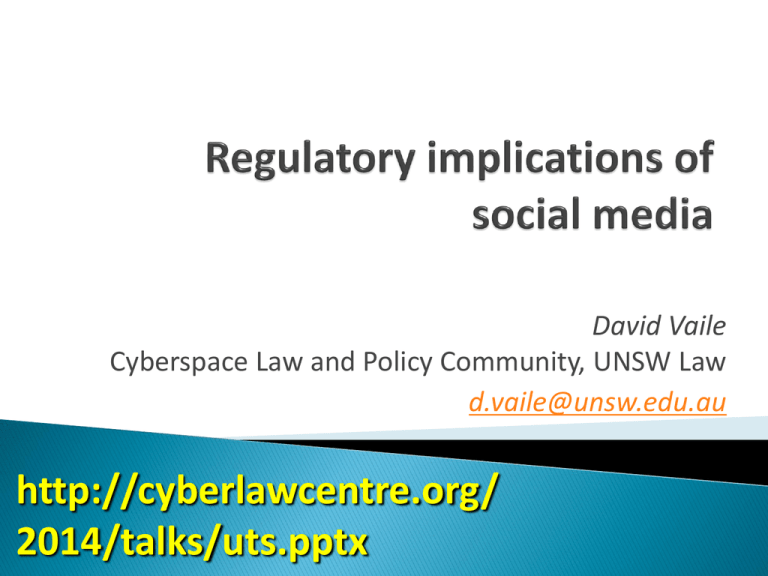
David Vaile
Cyberspace Law and Policy Community, UNSW Law
d.vaile@unsw.edu.au
http://cyberlawcentre.org/
2014/talks/uts.pptx
Collections
Background
Technological changes
◦ Web versions
Legal disconnects
◦ Common carriers mutate
Privacy and the cloud
4 Riders of the PI-calypse
Background
Malware and baddies
Govt Surveillance
Facebook, endless party
Social Media/push to share
Cult of Disruption: bludgers?
Big Data
Revenge porn: revenge of
crim law!
Examples
•
My profile, 33 mags
•
Big Data Analytics and
Behavioural Profiling
•
Cult of Disruption
•
Facebook, Google and Social
Media Privacy
•
Harrassment, revenge porn and
bullying online
•
Uberveillance
•
Whistleblowers and leakers
Tech changes
Legal changes
Offline world was nice and simple, for regulators
Web 1.0: global publication, old media/publish models
Web 2.0: social networking, user generated content
◦ Convergence of producer and consumer, + distributor
Web 3.0?: mass personalisation, semantic web
◦ It’s not just your friends who know you and what you mean
Attack of the killer toddlers – we are so old
◦ Hackers retire at 15, kids turning filter tables on parents, slash
Reader
Producer
Importer
Block
here?
Publisher
Block
here?
Viewer
Listener
Producer
Publisher
Reader
Producer
Publisher
Reader
Producer
Publisher
Reader
Producer
Publisher
Reader
Producer
Publisher
Reader
ISPs: the new block point
Cyberlibertarian fantasies still delude and excite
Reality: Jurisdiction out of control, hyper liability (for you)
◦ Intensification not escape from jurisdiction (revenge of the States)
Or: no care, and no responsibility? (for the cloud)
◦ Your data and business go offshore, but not legal protection
The rise of the sub-human: minors at the frontier
◦ Deficit in ‘consequences’ cognitive development: paternalism?
◦ ‘Under the age of 18 or appears to be under 18’
The fall of the ‘common carrier’: ISPs’ change masters?
◦ Agents of a foreign power, or a hostile litigant interest? iiNet
◦ Enforced discipline of their customers, on pain of sharing liability.
Drowning in Codes: Enforceability optional, Claytons law
At risk?
The Four Riders of the Apocalypse:
◦
◦
◦
◦
You, your mate, YouTube and FaceBook
The evil data mongers of cyber-Russia
Businesses who just want to know you
Government agencies who just need to catch you
One law to rule them all?
Will our current apathy become as unfashionable as
climate change denial when consequences realised?
Or are privacy advocates just old paranoid whingers?
Are we (almost) all part of the
problem?
I start from User/ Citizen/ Consumer/ Voter/ Customer
perspective, so not take other stakeholders at face value.
Risk driven development, ‘User centred design’ is the only way
to make safe software that works. Risks for users first & main
thing.
(Backed up by consumer protection experience; Codes often fail)
Other participants, stakeholders, interests in online social media
often claim to be, like Kevin, ‘here to help’.
But most have potential conflict of interest, so use spin to deny.
Necessary to recognise that, rather than there being a bunch of
bad guys, tame consumers & nice helpers, many are complicit …
• Overzealous
OU
• and Your
‘Friends’
• Overopportunist
GOV’T
BUSINESS
YOU
CRIMINALs
• Hacking
Government has powers of compulsion as well as persuasion,
and can be tempted to exploit fears to act in secret. [PRISM]
Regulators are subject to risk of ‘capture’ and taming.
Businesses undermining a strong approach to respect for self
and others’ privacy have both a strong profit motive, and the
best tools of persuasion and spin, as advertisers and marketers!
‘Bad guys’ are not going to be ‘scare the horses’ by being very
visible in their exploitation of over sharing, but they’re skilled.
Individuals trampling the rights of themselves, friends or
strangers tend to lower the bar, normalising risky behaviour.
All work against your interest in security – how to turn around?
One goal of the Riders is to capture personal information by a
process of luring it out into the open.
Claiming a bit of info about you is ‘public’ is not for some
enhanced communal social space, the normal idea of ‘public’.
though encouraging people to be public seems harmless ...
But it is often with the ulterior motive of re-capturing the PI
and appropriating it back into different private hands, grabbing
it for private uses often hostile to the original owner:
Psycho-graphic profiling for marketing; Mass surveillance by
secret foreign spy services; setting up a scam by fraudsters.
Presumption by many that government and industry are ‘here
to help’, rather than both being part of the problems.
Much cybersafety and cybersecurity education material is
distorted by this assumption.
Good players in all four sectors - but serious risks from all too.
Failing to see this may blind users to the worst risks for them
in a given situation.
Also conveniently avoids focusing attention on governance
and public policy failures which create those institutional
risks.
Global online Business models: Social Media built on Users
being data-hamsters (‘you are the product’), not Customers.
CONFLICT?
Government concern about abuses, but tempted by access to
wantonly exposed data (retention, data mining). CONFLICT?
Bad guys adapting fast to the active promotion of gullible self
indulgence, harvesting for anti-police face recognition efforts.
Some Individuals disrespectful of their own, and other
people’s, personal information security and privacy.
Ignorance, youth: key – CONSEQUENCES?
These four nasties should not lower the bar.
Cybercrime goes invisible
Dare not speak its name; researchers threatened
Bad guys based in former SU lift off into cyberspace
You’ll never know where they came from or went
Malware and the failure of IT perimiter security
Social engineering: the new computer infection
Recombinant undetectable malware evolution
All your dataz are belong to us: zombie networks
Leave no clues
Losing the war? Provoking Vigilantism?
The business of business is business: How dare you
interfere with my marketing! – Adware detector defeat
Spam Act (Cth) v CAN-SPAM Act (US): opt-in or opt-out?
◦ Opt-out: The very model of a doomed and futile gesture
◦ No clear distinction between respectful and crook
Everyone is a sales agent: freebies for viral promotion?
◦ Who’s responsible for the lies or the pitch? Facebook & Google?
No clear line? Incentive for opportunists to creep to bad
◦ There should be no room on the fence, just pointy splinters
◦ Unrestrained submission to entrepreneurial instinct
blurs any lines between ethical and desparate: race to bottom
Exceptional to routine?
Perfect free copy tools provoke evidence gathering
Marketers demand right to ‘behavioural targeting’
Data aggregators prefer not to discuss it
Law enforcement assumes we’ll be safer if we forfeit
centuries of protections against strong states
Data retention obligations coming in from offshore
Data heading offshore, scant restraint or redress
Filtering logs look awfully tempting …
Data breach notifications? Or ‘Informed consent’ FAIL?
All supported by invisibility, and the cult of exposure
Persistent AGD proposals to
‘modernise’ telecoms interception
Understandable, w. death of u/cover?
But Cybercrime Convention is law:
is it now all academic?
Recent proposal; history ‘OzLog’
No legislation. No costing. No justification
Spooks wish list. But refusal to explain, ctee rejects
A grab too far? Back pedal...
But Cybercrime Convention bill passes with few changes
Who needs anything else?! Conventions.coe.int
ISPs to become agents of foreign powers, litigants?
Snowden revelations: already happening?
Latest: NSA/ASD hoovering online webmail/chat address
books – warrantless, suspicionless omnivorous spying?
- overlap between Facebook, Google, Apple, MS and NSA/ASD?
Deliberate and systematic imbalance
in cost/risk analysis by Yoof
Failures are invisible
Training not to care
about protecting personal
information security of ‘friends’,
or yourself
10m members in Oz, no phone, minimal presence
Hiding in the cloud – lurking outside legal reach
Unwilling even to enforce own rules – Senate U13 Q
Already lead to collapse of undercover policing?
Used now by police and others to gather evidence
Disasters from over exposure often occur several steps
away in time, and in social and real space
Capacity to identify potential consequences is weakest at
time of initial addiction
Encourages culture of not caring about risk. But reality...
All the info and incentives go one way…
Vendor
promotes!
Over-sharing
seems normal…
Cost/benefit
analysis FAIL
Information
asymmetry
Software
promotes!
Minors think it’s
a party!
Victims hide:
silence, shame
It’s permanent global publication; but without the editor,
lawyer, publisher or shredder.
All very new, rules change daily, no base of social experience to
build a new ‘common sense’, no shared history of known Fails.
Failure to appreciate consequences are not here, now, visible.
Kids cognitive deficit – special vulnerability – need protection
from everyone, including themselves (they are NOT adults!)
Teenagers: consequence has to be right here & now to matter
Children: even right here & now can be denied. [ACCAN eg.]
Denial is part of the problem; must help kids grow out of it.
Adults potentially deluded: by collusion of conflicted businesses
with over-sharing choices, by friends, by info. asymmetry,
secrecy.
Past ‘common sense’ about tech. eg photos no longer apply:
permanent global publication, face recognition, tagging,
invisible.
Eg: “Glassholes” backlash against Google Glass: a sign that
novelty is no longer enough to befuddle? Desire to protect space
Aggressive appropriation of public space by those with new
social surveillance tools is hostile to the interests of others.
Impact of Facebook on policing not widely admitted, but serious.
Prospects for employment, insurance, housing, travel, security
clearance, public office …
Damage to personal relationships, trust, family, marriage, sex …
Sexual or other harassment, smearing, shaming, vilification.
ID theft, fraud, burglary, robbery, scams, framing.
Profiling as national security, criminal or political risk; blackmail.
Recruitment into inappropriate activities of all sorts by
pressure.
Personalised messaging designed to ‘go under the radar’, use
personal preferences to avoid critical assessment of message.
Social media is self advertising, and advertising for the self,
but it only tells half the story, the bad news tends not to get out.
Benefits are obvious, immediate, personal, and flogged to death.
Risks and costs are remote in time, place or social space.
Funsters advertise themselves and fun, but like most privacy
disasters, privacy failure victims often hide, drop out, are socially
excluded, go quite, self harm, even suicide.
They do NOT say: ‘Hey everyone, I was a real idiot, who knew
there is a real world out there and not everyone is my friend?
Don’t be stupid, and learn from my mistakes!’ So no feedback.
Result: Users are unaware; unable to properly weigh cost cf. risk.
So? ‘Informed consent’ re: sharing is undermined, unreliable.
Buzzword or the Big New Thing of 2011?
Online social networking giants are creative software engineering &
advertising powerhouses, driven by hacker instincts, massive.
‘Move fast and break [take?] things’, ‘Ask forgiveness not
permission’ are slogans from immature software developers raised
to work with disposable throwaway prototypes, not Compliance.
Category error: human personal information, the stuff of lives, is
NOT disposable. ‘Oops, we’ll fix it next version!’ is not an answer
when personal information abuse causes irrevocable harm. Their
governance model, based on rapid prototyping, cannot cope.
These models are now so profitable that there is now great
commercial pressure to NOT adapt to this hard and real truth.
The hype: ‘Disruptive Innovation’ – some truth
But aim is to hide the often very old motives, avoid your debts:
◦ Tax, Rent, Wages, Insurance, Licence fees – can you avoid it?
◦ Responsibility and Liability for your actions – can you avoid it?
Can conflate great software and innovation with freeloading
bludger’s desire to grab the goodies and get some sucker to pay.
Always frames the benefits, rarely the costs or risks
When costs appear, just the price of progress
In reality, can be a threat to good business, government or jobs
Uber, Lyft, TaskRabbit, AirBnB, Google, Facebook
Buzzword or the Big New Thing of 2011?
The hype: everyone’s doing it, big in 2011
Real differences
◦ Dirty, incomplete data OK
◦ Predictive analytics
◦ Want everything, real time, forever
Implications
◦ Death of privacy, causation, security, anonymity, …
Default policy? [See also Open Data]
Don’t mention the risk projection onto data subjects…
Old offence but good offence, in NSW
New laws in US
Police v Usmanov [2011] NSWLC 40: Posted ‘sexy selfie’
extorted as Trust (Don’t do it!). Defied police, charged.
Plea of guilty in local court, expected discount
Dep Chief Magistrate not impressed, calc, 6 months
Dist Court Appeal on sentence – 6 months confirmed!
Lawyer found no reference to Facebook, assumed no
big deal. FAIL! Intent was intimidation, sentence to fit
No mention of internet in the law
Works like a treat for the women who ring me up in
the night with a tale of sexy selfies gone astray...
US law made to fit – but no need here?
Simpler than bullying – very useful offence
Nothing new under the sun – Internet, Schminternet?
Lawyer may have given poor advice
Atypical case, guilty plea – about sentence, not conviction
Could be harder to prove guilt if contested
Shocking result for some: 6 months jail for posting photo
Reminds us that cybercrime and other offences often have
severe penalties
Not much use if rarely enforced... except: quote to perps?
http://cyberlawcentre.org/2014/talks/uts.pptx
It’s not censorship,
Won’t somebody think of the children?
1,000 items in 1,000,000,000,000, no checking
10 billion change per month
Appalling spin and shifting goals for the magic box
Appeasing the swinging fundamentalists?
Real child protectors: What risks? Does filtering work?
Parents want to be rescued: Panic Button is for them
Cargo cult mentality, denial, and hope of a saviour
Does not address real problems: resilience, detection
of criminals, communication with techno kids
Sexting, ‘slash’ fiction and innocents on the loose
Filtering and young people project
Surely it is censorship?
Offline model: centralised distribution, choke points
Web 1.0: more distributors, easier importation
Web 2.0: everyone is a creator, (re)-publisher, exporter
Web 3.0: the cloud knows what you like, and makes it?
Encryption and roll-your-own protocols already in use
The long cyber-war: endless arms race between the
straiteners and those seeking to avoid the blocks?
When is publication not publication? Personal message?
Chinese solution: you never know: the Panopticon:
(no-one is home, but you self censor)
Mandatory Black list filter is dead, cd not be legislated
The Secret ad-hoc pseudo-voluntary filter lives!
Major ISPs do it.
s313(1) Telecommunications Act (Cth): ISP and carriers
“do your best” to prevent commission of offences online
Knock at the door, demand to take down or block a site
1200 and 240,000 false hits
Scarily out of control, though criminal only.
See also s313(3), give “reasonably necessary help” to
officers and agencies for data retention, tapping etc.

